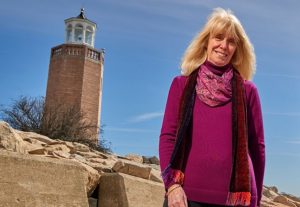Ann Bucklin, Professor Emeritus of Marine Sciences, has been appointed U.S. Academic Delegate to the International Council for the Exploration of the Sea (ICES https://www.ices.dk). This appointment, made by the Department of State on August 17, 2023, authorizes Prof. Bucklin to serve as one of the two U.S. representatives on the ICES Council, which is the decision and policy-making body in ICES. The U.S. Academic Delegate is focused on encouraging and coordinating ICES-related research and activities in the academic community.
What is ICES and its mission?
ICES is a leading multidisciplinary scientific forum for exchanging information and ideas on all aspects of marine sciences, including environmental, scientific, fisheries, wildlife, and conservation affairs, pertaining to the North Atlantic Ocean, including the Baltic Sea and North Sea. Principal functions of ICES, since it was established in 1902 and continuing to the present time, are to: 1) promote, encourage, develop, and coordinate marine research; 2) publish and otherwise disseminate results of research; and 3) provide non-biased, non-political scientific advice. The ICES mission and goals are guided by a Strategic Plan, which identifies and addresses critical themes in science, collaboration, advice, data, communication, and service support. See: https://www.ices.dk/about-ICES/how-we-work/Pages/Our-strategy.aspx
How is ICES organized?
The principal decision- and policy-making body of ICES is the Council, which consists of a president and two delegates from each of 20 member nations across Europe and North America. One of the U.S. delegates is a federal employee and the other represents the academic community. The mission of ICES is accomplished by various committees and working groups. The Advisory Committee (ACOM) provides advice on fisheries and marine ecosystem issues. The Science Committee (SCICOM) oversees all aspects of the scientific work. Steering Groups coordinate more than 100 expert groups covering most aspects of the marine ecosystem that work under them. The scientific work of ICES is done by a community of more than 1,600 marine scientists from research institutes and universities in member and affiliate nations collaborating in expert working and study groups.
What’s the focus of your research and its relevance to your appointment as U.S. Academic Delegate?
My research focus is molecular analysis of biogeography and biodiversity of marine zooplankton, including population genetics of important species (especially copepods and euphausiids), local-to-global patterns of species diversity, and analysis of pelagic food webs based on DNA barcoding and metabarcoding. An important focus is time-series analysis of marine zooplankton species biodiversity, with applications for ecosystem monitoring and fisheries management on the NW Atlantic continental shelf. I have been a member of the ICES Working Group of Zooplankton Ecology (WGZE) and Working Group on Integrative Morphological and Molecular Taxonomy (WGIMT) since 2007; I served as Chair of WGIMT during 2014-2017. I am a grateful recipient of an ICES Service Award (2018) and an ICES Outstanding Achievement Award (2019). See: https://marinesciences.uconn.edu/person/ann-bucklin/ and https://en.wikipedia.org/wiki/Ann_Bucklin
What are your thoughts about being appointed the U.S. Academic Delegate?
I have participated in ICES activities for many years. The ICES Annual Science Conference (ASC) is a valuable forum for the exchange of research results and exploration of important applications for ecosystem assessment and fisheries management. I am honored to have been appointed as the U.S. Academic Delegate and look forward to contributing to the ICES organization. A primary goal is to encourage broader participation from the U.S. academic community, including active researchers, Early Career Scientists, and students.
